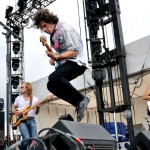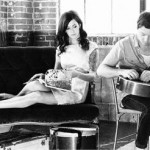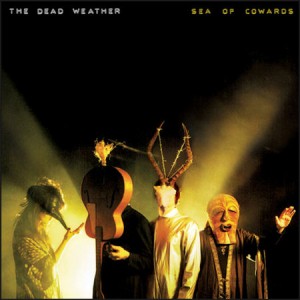 Rating:
Rating: 




Did you say Alison Mosshart? Yes please! Wait, Jack White too? Absolutely! These were the thoughts of many as news broke of a collaboration between the two, to be named Dead Weather. Now the band have released their debut, Horehound, and for many, this album will be precisely what you wanted to get from the band, but for others, it might seem like the blues-rock version of Phish.
As the album opens with “60 Feet Tall” Mosshart makes her presence known. Her sexually toned lyrics are full with the spirit of the blues, much as they were on the The Kills first album, Keep On Your Mean Side. Sure, the song is full of ear-splitting guitar work, but it kind of seems as if the band is trying to indulge in their classic-rock chops just a bit too much, leaving Mosshart as the standout for the album within the opening minutes.
“Hang You From the Heavens” was the first single from the album, and it definitely packs a bit of a punch. Fuzzed out guitars burn up and down through the song, meeting with the vocals of Alison as the seems to writhe in the negative space of the song. Perfecting the single is Jack White’s drumming, which will never be confused for the most exhilarating, but as he shows in this song, he knows just how to put the right touch on a song; he’s done this for years, and we can assume he will continue on that path.
“So Far From Your Weapon” demonstrates the lackluster elements of Horehound. Slow pacing and sparse instrumentation definitely make the tracks a lot weaker, as if the band’s meandering through their pantheon of influences took too much of the focus away from the band’s songwriting. But, it’s juxtaposed with “Treat Me Like Your Mother,” a stomper of a song where White and Mosshart’s vocals collide in a furious explosion before guitars splice up the song, albeit momentarily. But, yet another fault is that this song goes on way beyond where it should. The groups seems to carry on, treading the proverbial water of this song.
So you come to the latter half of the album with songs like “Bone House” and “3 Birds.” The only thing that goes on for a majority of this part of the album is the vocals of Mosshart. In “Bone House” it’s her come-hither-howl that draws any attention to the song at all. “3 Birds” as an instrumental song doesn’t seem to tell a story at all, as most instrumentals should do, instead it just exposes the lack of creativity that seems to be thrown into the mix far too often for the liking of most listeners.
This all sort of sums up the record as a whole. Mosshart saves the album, as her dominating vocals never seem to lose their touch on the ear of listeners, but the music itself doesn’t seem to be much more than an exploration, and a poor one at that, of styles long gone away. Sure, blues and classic rock have their place in the history of American music, but this album can’t kiss the feet of either of those two genres.
 We battled the elements. We battled our livers. We battled the battles. Really happy I had a legit excuse to not watch the Longhorns. Yech.
We battled the elements. We battled our livers. We battled the battles. Really happy I had a legit excuse to not watch the Longhorns. Yech.












